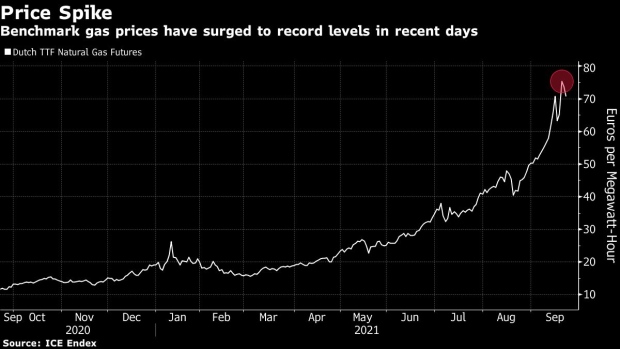Sep 22, 2021
Energy Price Jump Hijacks EU Debate on Green Overhaul
, Bloomberg News

(Bloomberg) -- The unprecedented spike in natural gas and power prices is forcing its way up the European Union’s political agenda after hijacking a meeting of member states on the bloc’s ambitious transition to a green economy.
Ministers from most of the region’s 27 nations, from Sweden to Greece, voiced concerns at their gathering in Slovenia on Wednesday about energy prices hitting all-time highs. Rates have soared just as the bloc’s economies are rebounding from the Covid-19 pandemic, which could slow down political talks about turning EU’s strategy to reach climate neutrality into reality.
The energy crisis is likely to be added to the agenda when EU leaders meet for a summit on Oct. 21-22 after several countries, led by Spain, pushed for it, according to an EU official with knowledge of the matter. Romania, Italy, Poland and Hungary also pushed for the topic to be discussed then, according to an official of the European Commission.
“‘We asked the EU Commission to start in-depth talks with member states about the causes that led to the surge in energy prices, both for electricity and gas and to identify the appropriate solutions at the EU level,” Romanian energy minister Virgil Popescu said on Facebook.
The commission, the EU’s executive arm, will announce later on Wednesday that it is preparing an overview of measures that member states can take to tackle the energy crunch, the commission official said. Under the bloc’s law, the commission has limited powers in the area of energy, which remains largely in the hands of national governments.
“We will of course discuss the difficult situation in Europe as a result of high gas prices and the dependence on imports from Russia,” Austrian Energy Minister Leonore Gewessler said before the gathering in Brdo. “I’m convinced that our response has to be a faster and more accelerated transition to renewable energy.”
At their meeting in Slovenia, the ministers were due to debate draft laws proposed by the European Commission to boost the share of renewables and to increase energy savings as part of a tighter emissions-reduction goal by 2030. Lithuanian Energy Minister Dainius Kreivys said before the meeting that while the spike in gas prices needs an “international effort,” the EU climate and energy package would protect the region against the rising costs of fossil fuels.
During their debate, the ministers raised the issues of price volatility and the impact of soaring energy costs on public support for the clean shift, said a person with knowledge of the talks. Some were concerned about the social consequences of the EU proposal to extend the region’s carbon market to fossil fuels used in transport and buildings, said the person, who declined to be identified because the meeting is private.
Earlier this week, Spain warned the European Commission that the energy crisis could hinder public support for the Green Deal, which aims for Europe to become the world’s first climate-neutral continent by 2050. In a document aimed at triggering a broader EU discussion, Spain suggested creating a central platform to buy natural gas. That would boost the EU’s bargaining power and limit its dependence on suppliers such as Russia.
Poland on Wednesday asked the commission to take a closer look at what it suspects could be market manipulation by Russian gas exporter Gazprom, according to another person with knowledge of the talks. It also wants the EU to use its foreign investment screening regulation to check if the controversial Nord Stream 2 pipeline is in line with the bloc’s rules, the person said.
(Updates with calls on EU leaders in the first paragraph.)
©2021 Bloomberg L.P.


